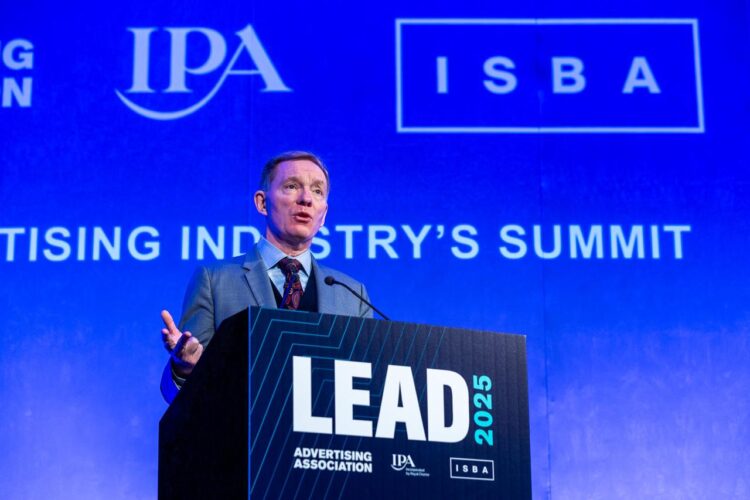Chris Bryant: Labour is seeking ‘sensible solution’ on LHF

“Advertising is fundamentally about trust.”
At Thursday’s LEAD conference, held in Westminster’s Queen Elizabeth II Centre, Sir Chris Bryant, Minister of State for Media, Tourism and Creative Industries, set the tone for the ad industry event by focusing on the issue of trust— be it brand safety on social platforms or strengthening relationships between brands and agencies.
Expressing pride in the industry, Bryant said he believes the talent in advertising is “in many regards more imaginative than nearly all the other parts of the creative industries put together”. He celebrated the industry’s core place in supporting not just creative businesses but the wider British economy.
“This is an ecosystem,” he told delegates. “You don’t get great British films without great British marketing of films. You don’t get great British films without actors who probably performed on the stage as well as in television. And you don’t get great British actors without a commercial theatre that’s successful in the UK. And without a subsidised theatre in the UK… all of these things hang together and that’s why it’s important to support the whole sector.”
Bryant, who took the stage after a brief delay following his announcement (he joked that he was preoccupied with backstage gossip about the next Bond), noted that the UK is the second-largest exporter of advertising in the world, adding: “I think we could do a great deal more about boasting about that.”
Balancing growth with AI responsibility
Since Labour took power last summer, the party has repeatedly stressed the importance of driving strong economic growth to revitalise the economy. At LEAD, Bryant referenced the Yazz song The Only Way is Up as signifying the cooperative stance Labour is taking.
Among Labour’s many proposals for stimulating growth is increased investment in AI development — much to the concern of media owners that have expressed unease about copyright infringement.
Addressing the House of Commons this week, Sajeeda Merali, CEO of the Professional Publishers Association, said it is “vital that fair competition remains at the centre of AI development, where both the spirit and letter of copyright law apply. This currently isn’t happening. AI platforms are failing to respect existing copyright law and opt-out agreements, jeopardising the funding that makes quality content possible”.
She warned that the publishing industry faces an “existential crisis” if the government “fails to get this right”.
In his speech, Bryant addressed such concerns, albeit on a general level.
“All I can say on this is we’re engaged in a consultation on this as it pertains to copyright,” he said. “I am absolutely clear that we as a country sell IP [intellectual property]. It’s one of the key things that we sell. So making sure that we have a strong copyright system in the UK, that we maintain that ability for people to be remunerated and control their rights, is a vital part of what we do in this field.”
Still, he argued, “we think there’s a possibility that there’s a win-win for this” in which AI can drive growth while IP is protected.
Bryant added that he believes first and foremost that providing “political, fiscal and economic stability” in the UK is paramount to the success of the creative industries, “so that people can make long-term investments”.
He further suggested that strong education policy that supports creative education for “every single child in the country” — not just those in private education — is required for long-term growth in what has become one of Britain’s most successful export industries. According to Bryant, while STEM is great, STEAM (adding an A for arts) is even better.
Government seeking ‘sensible solution’ on LHF
More pertinently, Bryant addressed what has become one of the UK ad industry’s biggest bugbears in recent times: uncertainty around less healthy food (LHF) advertising policy.
In January, the Advertising Standards Authority (ASA) and Committee of Advertising Practice announced that they were revising their guidance related to the forthcoming LHF advertising ban, which is set to come into force on 1 October, over a change in the legal interpretation of what is likely to qualify under the legislation.
Specifically, brand advertising — defined as “advertising by brands that does not explicitly refer to or feature products” — was previously thought to fall outside the scope of restrictions, but due to inexact language in the law, this may no longer be the case. Final guidance is expected to be released in the spring.
During the conference, ITV commercial managing director Kelly Williams referred to the legislation — and uncertainty over its enforcement — as “not helpful”.
“It’s important the government follows through on their original intention when it comes to brand advertisers,” Williams said.
Bryant told the conference he has had “several meetings with the ASA” and that the government is “very keen on coming to a sensible solution”.
“I think a bit of common sense in this space would be really, really useful,” Bryant continued. “We discussed the matter. I’m saying to you what I said to the ASA the other day: our priority is proportionate regulation and clear guidance for businesses operating in the sector.”
He concluded his speech by reinforcing Labour’s support for the industry.
“We are very serious about growing the creative industries in the UK,” he said. “If the UK had no creative industries, we would be a poorer, a weaker, a less happy, a less stable society than we are.”
CAP to revise LHF guidance over lack of clarity on brand advertising



